The writer’s creative brain works in mysterious ways.
Sometimes, it’s thrilling, like when you’re driving along and suddenly a new idea pops into your head for how to iron out that plot point you’ve been struggling with.
Or when you wake up with the story outline of your next novel neatly replaying in your mind, spurring you to get it down before you forget.
Sometimes, though, it’s a royal pain, like when you’re dead tired and you go to bed hoping to pass out and instead, your writing brain runs on and on with “what-if” scenarios until 3:00 in the morning.
What can you do then to get that precious sleep you need? I’ve got some ideas for you.
 You Need Your Sleep to Stay Healthy and Alert
You Need Your Sleep to Stay Healthy and Alert
You know that you need a good night’s sleep to be at your best. You’ve heard about those studies showing that chronic sleep deprivation can do nasty things to your health.
Indeed, when you regularly fail to get 7-8 hours of sleep at night, you increase your risk of heart disease, diabetes, obesity, cancer, and even premature death. Not good.
Sleep deprivation affects you mentally, too. Studies show that it hits attention first—extremely detrimental to a writer—and next, working memory. Worse, it depletes your creativity. One study found that students deprived of sleep for 32 hours performed worse on tests of divergent (out-of-the-box) thinking, flexibility, and originality, then those who got a good night’s sleep.
In other words, if you don’t get enough sleep, you’re likely to fall back on clichés and standard plots in your work. Getting enough sleep, on the other hand, boosts creativity. Researchers reported on this in 2003. They had one group spend the day trying to find a solution to a problem, while a second group slept on it. Twice as many participants who slept on the problem gained insight into the solution.
So okay, we need our sleep. How do we get it when the writing brain just won’t shut up?
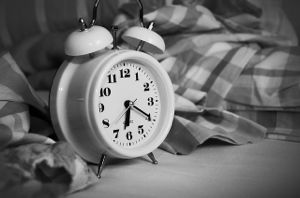 The Creative Brain Has Long Battled with Insomnia
The Creative Brain Has Long Battled with Insomnia
Writer and editor Nichole Bernier conducted her own survey and writers and insomnia, and got some interesting results. I suggest you check them out here. Nearly 70 percent of her respondents felt so involved in their writing that they couldn’t get to sleep or stay asleep.
“When I’m working super well, I’ll wake up in the middle of the night in order to write stuff down,” one of her respondents said.
“My brain won’t turn off,” another commented.
Though some got up and tried to write (with mixed results), the nighttime wakefulness invariably led to difficulty focusing on writing projects the next day.
Yet the image of writers as insomniacs is nothing new. According to Greg Johnson, writing in national literary journal VQR, Frank Kafka, Charles Dickens, Sylvia Plath, William Wordsworth, Charlotte and Emily Bronte, and Walt Whitman all struggled with it, and though sometimes those sleepless nights can produce gems of creativity, most of the time they are associated with difficult consequences, such as the inability to produce anything worthwhile the next day.
Part of the problem is that when you go to bed and try to sleep, you’re not distracted by anything else. In today’s world, that’s actually rare, so it’s no surprise that your brain may choose that time to produce creative ideas about your writing.
If you’re a writer struggling with wakeful nights, or even if you usually sleep well, but are experiencing a period of insomnia, the following tips may help.
10 Tips to Help Your Creative Brain Get a Good Night’s Sleep
One cautionary note: Try not to let your nighttime wakefulness become a habit. Some writers find that when they get up and write, they establish an unhealthy habit. The brain goes, “Oh, okay, this is the time to write, so we’ll do that from now on!” Not a good idea for your health or your writing, long-term!
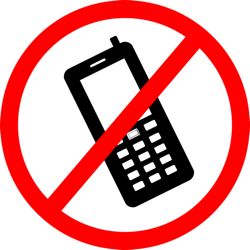 1. Make sure you’re turning all your gadgets off at least an hour before bed.
1. Make sure you’re turning all your gadgets off at least an hour before bed.
Our cell phones, tablets, and computers emit blue light that messes with melatonin, the sleep hormone. (Read more about that here.)
If you’re typing or researching or simply checking your Facebook feed before bed, you’re increasing your risk of sleeplessness.
Turn them off at least an hour before bed and read a print book or non-backlit tablet instead.
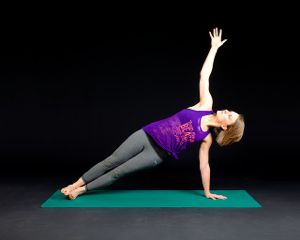 2. Exercise every day.
2. Exercise every day.
Exercise is one of the best ways to prepare your body and mind for sleep. It tires your muscles (especially if you work strength training in there a couple times a week) and helps ease stress, too, making it easier to fall asleep.
In a 2012 study, researchers reported that exercise was an effective treatment for insomnia, and the National Sleep Foundation states that exercise “significantly improves the sleep of people with chronic insomnia.”
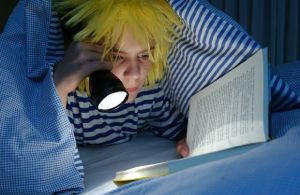 3. Read—short stories.
3. Read—short stories.
Reading is a great way to get your mind off your own writing and into another story. If you read a print book or non-lit tablet, it also relaxes you. The only problem is if you get into a book and don’t want to put it down! To reduce your risk of that, keep a collection of short stories by your bed, and once you finished one, turn off the light.
You can also try a boring book—one that you still want to read for whatever reason. Reading a little bit of it can gradually lead to finishing the book, while also helping to lure you to sleep.
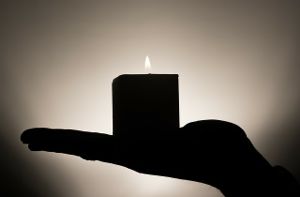 4. Try meditation.
4. Try meditation.
Meditation helps with a lot of things, but it can be particularly helpful for writers, because it disciplines the mind. The more you practice, the better you’ll get at letting things go—and sometimes that’s all you need to do to get to sleep at night. In a 2015 study, researchers found that six weeks of mindfulness meditation helped improve sleep quality, reduced daytime fatigue, and improved mood.
It doesn’t have to be complicated. Take 10-20 minutes a day to either sit quietly or even take a walk, and practice focusing on one thing. Could be an image, a candle flame, a distant tree, the horizon…whatever. Let your thoughts come and go without reacting to them. Just breathe and focus. Breathe and focus.
Once you get the idea, you can also use this at night to help you get back to sleep. Choose a calming image, focus on it, and breathe, letting your thoughts come and go without taking action on them.
 5. Use a paper notebook to jot down your ideas.
5. Use a paper notebook to jot down your ideas.
There have been countless nights and early mornings when I’ve filled up several pages of a printed notebook with the ideas that came to me when I was supposed to be sleeping. Many times those ideas were worth retaining, so I was glad I got them down. The act of writing also moves the ideas from your brain to the page so you can let go.
Just be sure to use a printed notebook and pen rather than an electronic gadget that will mess with your sleep patterns, and I’d suggest a small notebook—not a full-sized one. This will encourage you to jot notes rather than write chapters.
Use a small flashlight to light your way—red light works even better, as it’s easier on your eyes in the dark. The idea is to get those thoughts down while you’re still half asleep and to then shut off the light and go back to sleep. If you turn on a bright light, you’ll wake yourself up more.
 6. Practice stretching before you go to bed.
6. Practice stretching before you go to bed.
Tight muscles don’t encourage sleep. Yet most of us go to bed with tight muscles. They naturally tighten up during the day in response to activity, and if you don’t stretch them out, they’ll stay tight when you go to bed. That may make it harder to go to sleep, or wake you up later on as your muscles ache and hurt.
Stretching before bed helps prevent these issues, and also provides a natural way to relax your body and mind. Try a gentle yoga routine a half hour before you turn in, or just perform some common stretches like touching your toes, clasping your hands behind your back and pulling your shoulders back, sitting down and reaching for your ankles, etc. The process of stretching slows your mind and helps it get ready for a good night’s sleep, while warming your muscles and promoting relaxation.
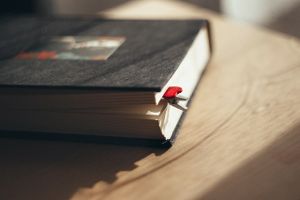 7. Journal—and include what you’re thankful for.
7. Journal—and include what you’re thankful for.
You may or may not keep regular writing notes, but if you’re having trouble sleeping, a journal can provide you with the solution. Get all your thoughts down in the journal about an hour before bed, and they’re less likely to wake you up later. You can write about your current project and any difficulties you may be having with it, or simply write about how you felt creatively as a writer that day.
It may also help to write down the things you’re grateful for. In a 2009 study, researchers found that gratitude was related to good sleep quality.
If you wake up in the middle of the night, journaling may help if you write about your insomnia. In that half-asleep mode, simply start writing (by hand) and let your thoughts drip onto the paper. You may discover what’s keeping you awake, and then you can address it, or you may simply get bored enough to go back to sleep.
 8. Diffuse some lavender into the room.
8. Diffuse some lavender into the room.
Aromatherapy can be very helpful when it comes to insomnia. Lavender, in particular, has shown in some studies to help reverse insomnia. In 2005, for example, researchers found that women, especially, experienced improvements in their sleep duration and quality when they were exposed to the scent of lavender through an aromatherapy diffuser.
Other studies have shown that lavender has sedative properties that can help calm and soothe. Other oils that work well include bergamot, ylang ylang, and jasmine.
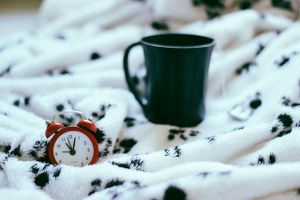 9. Drink the right beverage.
9. Drink the right beverage.
Some writers swear by that drink of wine at night, but beware—while it may help you fall asleep faster, it messes with your REM deep sleep, which is especially dangerous where your health is concerned. You won’t get a quality night’s sleep if you’re drinking alcohol before bed.
Try those beverages instead that are linked with a restful sleep. Tart cherry juice, for instance, increased sleep time and reduce insomnia in a couple studies—try 8 ounces twice a day. This juice also works as a natural pain reliever, so if you’re struggling with muscle aches at the end of the day, it may help you in more ways than one.
You can also try a cup of tea—many are associated with rest and relaxation. Some good options include chamomile, lemon balm, passionflower, lavender, and ginger.
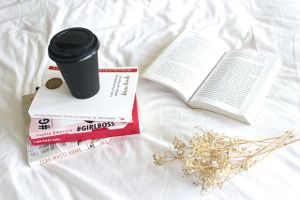 10. Create your own “winding down” routine.
10. Create your own “winding down” routine.
How do you get ready for bed? Do you have a regular routine that you follow, or do you run run run and then crash into the pillow?
The latter approach is more likely to lead to insomnia. Instead, create your own before-bed routine and start it an hour before you turn in. Fill that routine with quiet, dim, relaxing activities.
Shut down the gadgets. Turn down the lights. Turn off the noise. Take a nice warm bath or enjoy a hot cup of tea. Spend about 20 minutes stretching your muscles. Journal, color, read a book, or do something with your hands like knitting or crocheting. Let your world quiet down before you ask your body to sleep.
You may think you don’t have time for these activities, but if you don’t get the sleep you need, your health and your writing will suffer. Take the time to take care of yourself and you’ll be more productive during the day.
Final Note: Avoid Sleeping Pills!
One final caution—avoid sleeping pills if at all possible. A 2014 study of over 34,000 people reported that they doubled the risk of death!
A 2015 study also reported that taking sleeping pills regularly increased risk of cancerous tumors in the respiratory system. And in 2012, researchers reported that the top third of sleeping-pill users had a 5.3-fold higher death risk and a 35 percent higher risk of cancer. The brands tested included Ambien and Restoril.
Lead author Daniel F. Kripke told WebMD:
“We are not certain. But it looks like sleeping pills could be as risky as smoking cigarettes. It looks much more dangerous to take these pills than to treat insomnia another way.”
Try the ideas listed above, and if those don’t work, talk to your doctor, but do try to avoid a reliance on sleeping pills. If all else fails, get up and write! Just try not to make a habit of it.
Sources
Paula Alhola, Paivi Polo-Kantola, “Sleep deprivation: Impact on cognitive performance,” Neuropsychiatr Dis Treat., October 2007; 3(5):553-567, https://www.ncbi.nlm.nih.gov/pmc/articles/PMC2656292/.
Alice G. Walton, “7 Ways Sleep Affects the Brain (And What Happens If It Doesn’t Get Enough),” Forbes, December 9, 2016, https://www.forbes.com/sites/alicegwalton/2016/12/09/7-ways-sleep-affects-the-brain-and-what-happens-if-it-doesnt-get-enough/#51fd0013753c.
Ulrich Wagner, et al., “Sleep Inspires Insight,” Nature, January 22, 2004; 427:352-355, http://www.nature.com/nature/journal/v427/n6972/full/nature02223.html?foxtrotcallback=true.
Nichole Bernier, “Writers in Bed: Can’t Turn Off the Brain,” The Review Review, http://www.thereviewreview.net/publishing-tips/writers-bed-can%E2%80%99t-turn-brain-0.
Greg Johnson, “On the Edge of an Abyss: The Writer as Insomniac,” VQR, Autumn 1990, http://www.vqronline.org/essay/edge-abyss-writer-insomniac.
Giselle Soares Passos, et al., “Is exercise an alternative treatment for chronic insomnia?” Clinics (Sao Paulo, June 2012; 67(6):653-659, https://www.ncbi.nlm.nih.gov/pmc/articles/PMC3370319/.
“How Does Exercise Help Those with Chronic Insomnia?” National Sleep Foundation, https://sleepfoundation.org/ask-the-expert/how-does-exercise-help-those-chronic-insomnia.
David S. Black, “Mindfulness Meditation and Improvement in Sleep Quality and Daytime Impairment Among Older Adults with Sleep Disturbances,” JAMA Intern Med., 2015; 175(4):494-501, http://jamanetwork.com/journals/jamainternalmedicine/fullarticle/2110998.
Alex M. Wood, et al., “Gratitude influences sleep through the mechanism of pre-sleep cognitions,” Journal of Psychosomatic Research, 2009; 66:43-48, https://greatergood.berkeley.edu/images/application_uploads/Wood-GratitudeSleep.pdf.
Lewith GT, et al., “A single-blinded, randomized pilot study evaluating the aroma of Lavendula augustifolia as a treatment for mild insomnia,” J Altern Complement Med., August 2005; 11(4):631-7, https://www.ncbi.nlm.nih.gov/pubmed/16131287.
Ann Liu, et al., “Tart cherry juice increases sleep time in older adults with insomnia,” FASEB Journal, April 2014; 28(1):Suppl 830.9, http://www.fasebj.org/content/28/1_Supplement/830.9.
S. Weich, et al., “Effect of anxiolytic and hypnotic drug prescriptions on mortality hazards: retrospective cohort study,” BMJ, 2014; 348:g1996, http://www.bmj.com/content/348/bmj.g1996.
Sivertsen B, et al., “Use of sleep medications and risk of cancer: a matched case-control study,” Sleep Med., December 2015; 16(12):1552-5, https://www.ncbi.nlm.nih.gov/pubmed/26116466.
Daniel J. DeNoon, “Sleeping Pills Called ‘as Risky as Cigarettes,’” WebMD, February 27, 2012, http://www.webmd.com/sleep-disorders/news/20120227/sleeping-pills-called-as-risky-as-cigarettes#1.


What a great post! Loved it. I’ve discovered what you’ve discovered and point out here. When I mess up, and have more than my usual half glass of wine, I wake up mid-night. And if I stay I on my computer past dinner time, it affects me. Exercise is such a great way to combat insomnia. Whenever I’ve had a number of poor nights, I’ve forced myself to exercise and have been rewarded with a good night’s sleep. Thanks for all the reminders. 🙂
Thanks, Diana! Yes, I’ve found that with wine, too, and with exercise. We all need the reminders. Happy writing!